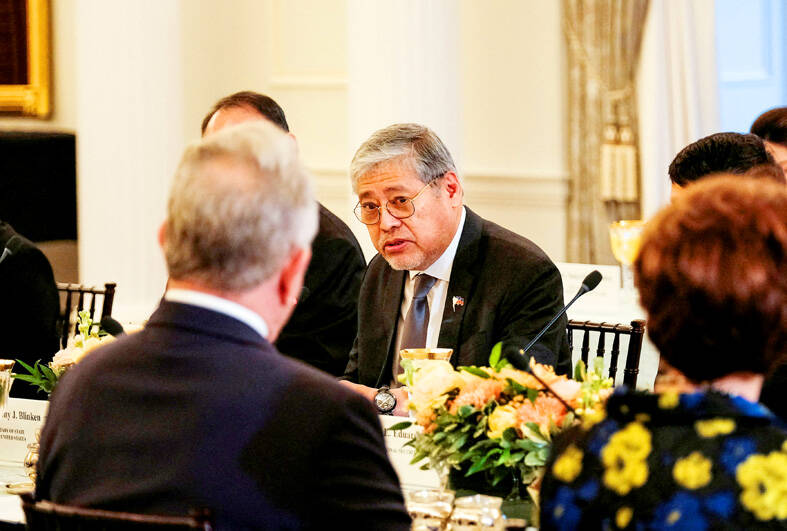Washington on Friday reassured the Philippines that the US is steadfastly committed to the country’s defense amid increasing concerns over provocative Chinese actions in disputed areas of the South China Sea.
A day after US President Joe Biden convened a trilateral summit involving himself, Japanese Prime Minister Fumio Kishida and Philippine President Ferdinand Marcos Jr, US Secretary of State Antony Blinken, US Secretary of Defense Lloyd Austin and US National Security Adviser Jake Sullivan hosted their Philippine counterparts at the US Department of State to discuss strategic and military issues
“Today’s meeting reflects the growing and deepening cooperation between our countries on a broad array of issues, and of course our shared commitment to a free and open Indo-Pacific, including in the South China Sea,” Blinken said in brief opening remarks. “We very much welcome this opportunity to pursue that cooperation, that collaboration, and of course we stand with the Philippines in our iron-clad defense commitments including the Mutual Defense Treaty.”

Photo: Reuters
Philippine Secretary of Foreign Affairs Enrique Manalo echoed those remarks.
“We attach a lot of importance to this meeting, especially in light of recent developments in the South China Sea, especially China’s escalation of its harassment,” he said. “We are determined to assert our sovereign rights, especially within our exclusive economic zone.”
Austin later hosted Marcos at the Pentagon, where they discussed ways to deepen military cooperation, including by increasing the frequency of joint patrols in the South China Sea.
Austin said that the Pentagon’s budget request for next year includes US$128 million for 36 projects at Enhanced Defense Cooperation Agreement sites, which would more than double the amount it has invested since the program began 10 years ago.
“This visit here to the Pentagon reaffirms once again the strength of the relationship between the United States and the Philippines in the face of all of the threats and challenges that we have had to face together,” Marcos said.
He said he hoped the agreements reached on Thursday “will make the safety, the peace and the stability of the South China Sea a reality.”

Taiwan is gearing up to celebrate the New Year at events across the country, headlined by the annual countdown and Taipei 101 fireworks display at midnight. Many of the events are to be livesteamed online. See below for lineups and links: Taipei Taipei’s New Year’s Party 2026 is to begin at 7pm and run until 1am, with the theme “Sailing to the Future.” South Korean girl group KARA is headlining the concert at Taipei City Hall Plaza, with additional performances by Amber An (安心亞), Nick Chou (周湯豪), hip-hop trio Nine One One (玖壹壹), Bii (畢書盡), girl group Genblue (幻藍小熊) and more. The festivities are to

Auckland rang in 2026 with a downtown fireworks display launched from New Zealand’s tallest structure, Sky Tower, making it the first major city to greet the new year at a celebration dampened by rain, while crowds in Taipei braved the elements to watch Taipei 101’s display. South Pacific countries are the first to bid farewell to 2025. Clocks struck midnight in Auckland, with a population of 1.7 million, 18 hours before the famous ball was to drop in New York’s Times Square. The five-minute display involved 3,500 fireworks launched from the 240m Sky Tower. Smaller community events were canceled across New Zealand’s

‘IRRESPONSIBLE’: Beijing’s constant disruption of the ‘status quo’ in the Taiwan Strait has damaged peace, stability and security in the Indo-Pacific region, MOFA said The Presidential Office yesterday condemned China’s launch of another military drill around Taiwan, saying such actions are a “unilateral provocation” that destabilizes regional peace and stability. China should immediately stop the irresponsible and provocative actions, Presidential Office spokeswoman Karen Kuo (郭雅慧) said, after the Chinese People’s Liberation Army (PLA) yesterday announced the start of a new round of joint exercises around Taiwan by the army, navy and air force, which it said were approaching “from different directions.” Code-named “Justice Mission 2025,” the exercises would be conducted in the Taiwan Strait and in areas north, southwest, southeast and east of Taiwan

UNDER WAY: The contract for advanced sensor systems would be fulfilled in Florida, and is expected to be completed by June 2031, the Pentagon said Lockheed Martin has been given a contract involving foreign military sales to Taiwan to meet what Washington calls “an urgent operational need” of Taiwan’s air force, the Pentagon said on Wednesday. The contract has a ceiling value of US$328.5 million, with US$157.3 million in foreign military sales funds obligated at the time of award, the Pentagon said in a statement. “This contract provides for the procurement and delivery of 55 Infrared Search and Track Legion Enhanced Sensor Pods, processors, pod containers and processor containers required to meet the urgent operational need of the Taiwan air force,” it said. The contract’s work would be